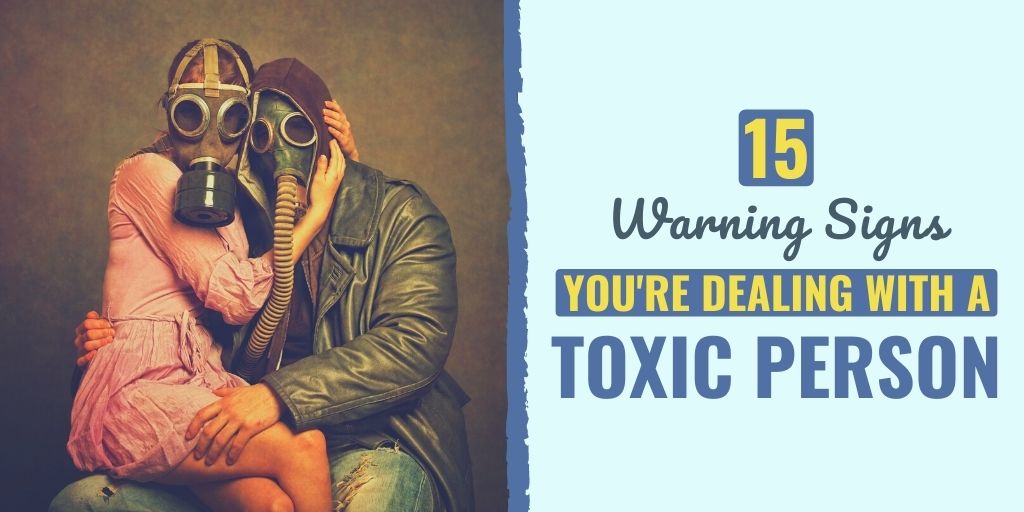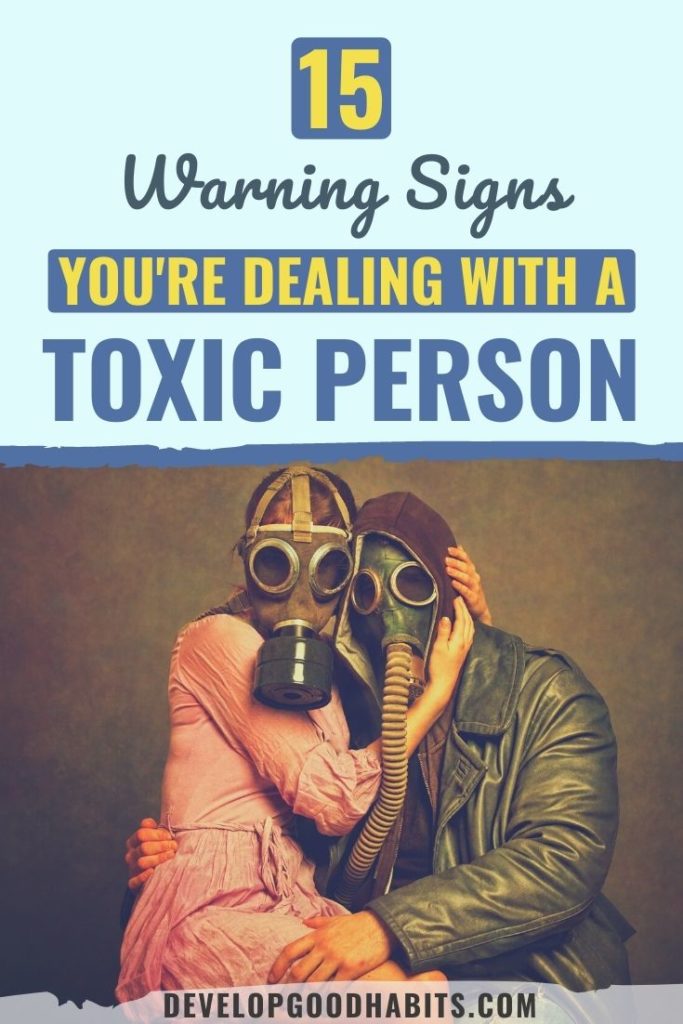There might be affiliate links on this page, which means we get a small commission of anything you buy. As an Amazon Associate we earn from qualifying purchases. Please do your own research before making any online purchase.
Are there toxic people in your life?
Perhaps you’ve experienced having that one fake friend who, when things are going well with your life, makes you feel like you’re still not good enough by pointing out your flaws instead affirming your success (for instance, someone who has a perpetual “crabs in a bucket mentality”).
Or you might have a partner or family member who makes you feel guilty about how great your life is while they are struggling with their own because they claim to be “victims” of a world that doesn’t give them any breaks.
Toxic people are harmful to your health.
Just how harmful are they?
Well, the results of a study published in the Journal of the American Medical Association revealed that being in a relationship with a negative person increases your risk of having heart disease, diabetes, and metabolism issues.
Some people probably become toxic as a result of their own experiences in life. For example, they may have been raised in a dysfunctional household where they were not taught to handle their emotions in a healthy way. But regardless of the source of their own negative behavior, its effects are felt in the present, and you’re most likely a target.
Although completely cutting off all communication with them is the simplest solution to avoid the negative effects of toxic people’s behavior, it is not always the most practical.
In this article, we will show you effective ways to deal with a toxic person in a relationship, in your family, and in the workplace.
First, let’s check out the signs of a toxic person.
(Side note: Another positive way to improve your life is to read and learn something new every day. A great tool to do this is to join over 1 million others and start your day with the latest FREE, informative news from this website.)
15 Signs a Person is Toxic to Your Life
1. You or others are blamed for the negative feelings and circumstances in their life.
Toxic people tend to project their feelings of inadequacy or insecurity towards the people closest to them rather than be accountable for these emotions. For example, someone who is in a bad mood but won’t own their feelings or take responsibility for them may turn to you and say, “You’re sure in a bad mood today,” which will probably leave you confused.
You’ll often find yourself on the defense without really understanding why. You will get accusations or questions that don’t make any sense to you or seemingly come out of nowhere.
2. You are wrong and they are right all the time.
When someone in your life does not admit mistakes and insists that you are wrong all the time, it’s likely that you’re dealing with a toxic person.
They will go to great extremes to be right, including changing facts or challenging your memories. Toxic people do not readily admit when they have made a mistake, miscalculated something, or misspoken. (Learn more about how toxic people poison the well when they want to discredit others.)
3. They disregard your boundaries.
It does not matter if you’ve requested that they stop behaving a certain way—a toxic person will continue to behave in a way that violates your wishes. Toxic people will also expect you to come through for them regardless of the time of day and your own personal circumstance. It’s almost impossible to build a positive, supportive relationship with people who disregard your boundaries and don’t even recognize when they’re walking all over you.
Your personal boundaries are the barriers that you set to separate yourself from the world around you. Your boundaries help define you and ensure that you are protected from people who are hurtful, disrespectful, and invasive. People with healthy boundaries know their own limits and can express themselves. However, people with unhealthy boundaries pull on you in aggressive ways and don’t know when to stop.
4. They are habitually dishonest.
Toxic people are known for their constant lies, even if they are about the smallest things. This could be a matter of exaggerating the facts of a story or truly making something up, a common manipulative tactic used by gaslighters.
They might do it because they have very low self-esteem and they are trying to give it a boost, or perhaps it’s their way of getting what they want. If a toxic person is telling you an elaborate story, you can typically assume that it is only a half-truth.
5. They don’t apologize.
Even if they are wrong, toxic people will usually not apologize. On instances when toxic people do apologize, it’s usually a calculated move to manipulate you to give them what they want. They always feel like they have to be right, no matter what, and will change the information in order to be right, or blame other people.
For more tips on how to deal with this, check out this post on how to handle ungrateful people.
6. They revel in being victims.
Their victim status is a manipulative strategy to gain sympathy and attention. Toxic people can always find someone else to blame for their problems. Maybe they missed a deadline because no one reminded them about it, or they are late for work because their spouse didn't set an alarm.
Bad things happen to everyone at some point. However, toxic people are happy to blame everyone else for their problems, including the problems they should take ownership of. But chances are, whatever happens to a toxic person will be someone else’s fault.
7. They are habitually sarcastic.
A little bit of sarcasm here and there can be funny. However, too much sarcasm can hurt people’s feelings and belittle them. Hence, it’s a favorite weapon of toxic people. Sarcasm is actually rooted in anger, distrust, and weakness.
Toxic people are so used to communicating with sarcasm that they can't see how much damage they're doing. When called out on it, toxic people often respond to the accusation of being hurtful with even more anger. Excessive sarcasm is never a healthy way to communicate with people.
8. They refuse to listen to you.
Toxic people act bored or change the conversation topic when you are talking. However, they expect you to listen to them when they’re the ones talking. Your talking takes away from any attention that could be on them and puts the focus on you.

Rather than listening to what you have to say in order to understand you, a toxic person will only be thinking of what they want to say next. They will seem uninterested in what you have to say and will turn the conversation back to themselves instead of trying to understand where you are coming from.
9. They feign concern for your welfare.
Pretending they are concerned about you is a ploy that toxic individuals often use to make you feel like they care about you, especially when you are beginning to sense that something is off.
This false sense of concern can be mistaken for genuine remorse, but it is actually just a calculated attempt to catch you at a weak moment or appeal to your sentimentality. Toxic people will suck you back into the relationship by showing you desirable behaviors as soon as they think you are about to wiggle your way free from their grip.
Remember, you deserve better.
10. They are critical of others.
You will notice that toxic people habitually put others down. If you are with someone who is constantly speaking poorly about others when those people are not around, chances are that they are doing the same to you.
Toxic people like to harp on the weaknesses that they see in others in order to boost their own self-esteem. They will verbally judge people for superficial things or harp on someone's honest mistake, and rarely point out the good in people.
11. They make you feel defensive about your decisions.
Everything you say or do is met with argument, and you begin to wonder if this person is questioning your intelligence. The criticisms and sarcasm directed at you can eventually take their toll and keep you on your guard.

You stop feeling like you can be yourself around this person in anticipation of them criticizing you and eventually find yourself filtering what you say when you’re conversing with a negative person.
12. They are inconsistent in their behavior.
Nothing is stable when you’re with a toxic person. Opinions, preferences, and plans could go one way today and another way tomorrow. Often, there isn’t an obvious explanation of the change in attitude—you can just tell something isn’t right.
They might be cold or cranky, and when asked if something's wrong, they say “nothing”—but they’ll add in a sigh or a facial expression to let you know that something is going on. You then probably look for ways to make them happy, which is why toxic people do this.
Toxic people know that decent people will go out of their way to keep the people around them happy. They realize that you are uncomfortable wondering what they're thinking. However, you shouldn't have to constantly guess which version of the person you will be interacting with each day.
For further reading, check out our article about how to spot the signs that people don't like you.
13. They have no interest in what’s important to you.
Instead, they will find a reason why your good news isn't so great. For example, if you are about to go on a trip to the beach, they might say, “The heat is going to be miserable.” Or, if you just got a promotion at work, they might say, “That's a huge amount of work for such little compensation.”
Talking about the good things happening in your life takes away the spotlight from them, so toxic friends or family members often use faultfinding to make you feel inferior. If you are really excited that something amazing just happened to you, you are often better off keeping it to yourself when you are around toxic people.
14. They boast about their achievements.
The need to brag has its roots in deep-seated insecurity. People who feel inferior spend their time overcompensating to make themselves appear to be superior to others. The only way these uncertain people can be happy is by making other people noticeably unhappy. Toxic people often brag to compensate for the shortcomings that they desperately hope you will never discover.

They will even take credit for someone else's accomplishments because they need the validation to feel like they are better than others. These people who have no sense of self-worth still have an intrinsic need to feel like a valuable member of society, and this need can only be met if they project their perceived greatness.
15. They take, take, and take.
As long as you’re able or willing, toxic people will take from you—your time, possessions, attention—without consideration or any thought of returning or giving back what they’ve taken. This is a form of manipulation. When you are with this person, you likely feel like you are the only one who is contributing to the relationship. Toxic people send a message that you owe something to them—and chances are, you believe it.
They are even able to take from you or hurt you in some way and then insist they did it all for you. This is especially common in relationships where there is some differentiation in power, such as in a working relationship.
For example, a supervisor may say, “I’ve left this three months’ worth of filing for you. I figured that you would appreciate the experience of learning how to use the filing cabinets” or, “I’m hosting a dinner party—why don’t you bring the food? It’ll give you the opportunity to show off your cooking skills.”
Below is an infographic depicting some types of toxic or negative people, and quick tips on how to free yourself from their influence.
Ways to Deal with Toxic Family Members
You probably know several negative people. However, unlike with friends or coworkers, you cannot completely avoid contact with toxic members of your family. Fortunately, the following suggestions can help you deal with these people.
Establish boundaries.
A healthy boundary system in a family incorporates a healthy mix of interaction and autonomy for each family member. For example, parents shouldn't talk to their children about conflict with each other, but they should talk to the children about how much they love them. And children should have age-appropriate autonomy, but not so much so that they feel neglected.
Make sure family members know what you can or cannot do for them. For example, communicate to your sister that you are uncomfortable picking her up every time she’s drunk over the limit and can’t drive herself.
Also let them know what things you can and cannot accept from them, whether it’s your mother’s spicy beef casserole or unsolicited advice on how to raise your children. It can be a challenge to determine where a boundary line should be, especially if it hasn't been clearly and mutually drawn. By having open communication about boundaries with your family, you can build healthier relationships that are safe and respectful.
Assert but don’t condescend.
Toxic people will often test your boundaries, and it’s the same with family members. Speak up if a family member is going over the limits that you’ve set. Be firm with your boundaries without making anyone feel bad. Tell them what you can do for them, but remind them that you also have to take care of your needs.
For example, if your sister continues to disregard your request to not call her during all hours of the night to give her a ride, find a time to assert your wishes without hurting her feelings. Say something like, “I really need to sleep—can we find you a different way to get you home safely?” rather than “Why are you so needy?” If you condescend to a negative person or make them feel attacked, they will attack back.
Avoid discussing private matters with them.
Although they are family, these negative individuals can use the private information you tell them as ammunition for an attack in the future.
Negative people are known for being dishonest, and while they can make up an entire story that could hurt you, they could also take a small detail of something you say and exaggerate it into something that it's not. If you're having problems in your personal life, don't drag them in to feed off of the drama.
Instead, give them general answers if they ask about what is going on in your life. Keep everything pretty neutral, and don't go deep into detail about problems you are having with your spouse or behavioral problems you are having with your children.
How to Deal With a Toxic Relationship
Here are some tips on how to deal with a difficult partner.
Acknowledge that you cannot change your toxic partner.
Sometimes, people in toxic relationships stay so long because they hope that they can help their partners change. You must let go of the idea that toxic people will change because of your assistance or insistence. It is important to understand that you cannot change anyone, especially those who are toxic. The only thing that you can change is their impact on your life.
If you have to co-exist with someone who is toxic, you must realize that you only have the power to change your own thoughts and actions. One of the things that make toxic people the way they are is that you can't reason with them. Their motives will never change from being selfish to being selfless.
Maintain your personal boundaries.
Similar to dealing with a toxic family member, you must set boundaries and assert them in relationships. Stand firm to these limits and let your partner know what is acceptable. Toxic people will make you work hard to please them, and before you know it, your boundary walls will have been demolished.
Be aware of what you can tolerate, and be prepared to defend your boundary walls. You never need to explain your boundaries to other people—you can simply say “no.” After you make your boundaries clear, there doesn't need to be any further discussion on the topic.
Seek the lessons you must learn in the relationship.
Often, people are brought to situations in order to teach them specific lessons on personal growth. Through meditation, discover what the relationship is teaching you about yourself. Often, being in a toxic relationship will teach you about your limits. While every relationship has a little drama, a toxic relationship will make you aware of how much adversity you’re actually willing to put up with.
You will also learn to listen to the people in your life who love you. Your friends aren't telling you that your partner isn't good for you because they're jealous of your relationship, they're telling you because they can see something that you can't through your rose-colored glasses. They're looking out for you. When leaving a toxic relationship, you will recognize that those who love you have had your best interest at heart.
You also learn to not compromise or sell yourself short. No longer will you be willing to give so much to a relationship and get little in return. You will think about your well-being and know the qualities to look out for in your next partner, and what to avoid.
Learn to let go.
Sometimes, the only solution to regain your health and well-being is to extricate yourself from the toxic relationship. Being alone might be a better alternative to being constantly belittled, as these quotes on being alone suggest. Reclaim your sense of worth. Believe that you deserve to be treated with kindness and respect and that you are worthy of being loved.
Focus on yourself and the things that you want. Take your desires off hold, because you have likely been convinced that you can't do the things that you love anymore. Be true to who you are and start loving yourself in ways that no one else can. Recognize the importance of your peace of mind, and that no one who disturbs it should be in your life.
If you need more information, read our guide on how to leave a narcissist. You may also want to learn about the no contact rule and how to do it.
How to Deal With a Toxic Person at Work
Here are some tips on how to deal with toxic people in the workplace.
Keep your distance.
Make yourself a difficult target for your toxic co-worker’s negative influence by putting as much distance between you as is practical within your work environment. Not only does this mean doing what you can to avoid working directly with them, but also having your office space as far away as possible.
If you work near a toxic person, you will likely be the first person they come to when they need some kind of attention. Not only is this distracting from your work, but the negativity will also start to bring you down. Avoid working in close proximity to toxic people, and certainly, avoid working directly with them on projects as much as possible.
The following six-minute video shows how you can identify and protect yourself from the influence of toxic people in your life.
Counter the negative with the positive.
Choose to be with positive people in the workplace. Consciously choose your words to reflect only the bright side of things. Should the opportunity arise, always say something positive when others are talking negatively about another co-worker, the boss, or the company you’re working for. (Remember, small minds discuss people.)
Just like negativity, your positivity can also be contagious. While this might not influence the behavior of the toxic co-worker, it can have an impact on those around you who are also being brought down by the toxic person's negativity. Spread joy as much as you can to change the atmosphere in the office.
Recharge from the negative influence with some self-care activities.
When you’ve been surrounded the whole day at work with the negative energy of toxic co-workers, you can regain your balance with self-care activities.
Practicing self-care means choosing activities that balance the impact of emotional stress, such as exercising, eating healthy meals, getting a full night's sleep, practicing meditation or relaxation techniques, being creative, and learning how to self-soothe your emotional distress. Keeping your body physically and mentally healthy will reduce the toll that toxic people can take on your life.
If all else fails, here are some useful tips on how to gracefully leave a toxic workplace.
Conclusion
The tips we just covered are a few ways that you can deal with a toxic person in any part of your life.
For them to be effective, you must be mindful of the moments when you need to apply them. Try them for the next few weeks, and see how it goes with the quality of your health and well-being.
Remember that no matter how much you love them, toxic people can only change if they want to. You can only offer them kindness and support. In the process, you must remember not to lose yourself to their demands or their negative influence. Stand your ground.
You must constantly work on developing habits that increase your overall positivity. This way, you can better cope when you’re around negative people who drain your energy because you will have a lot of positivity in your reserves. Check out this post for a definitive list of habits that energize you and keep you in the positive zone.
If, however, after reading this post, you realize that you may have some toxic traits, here's our guide on how to stop being a toxic person and you can also check out our roundup of toxic personality tests. Or if you think you are in a codependent relationship, take one of the codependency quizzes when listed in this post.
Finally, if you want another positive way to improve your life, then read and learn something new every day. A great tool to do this is to join over 1 million others and start your day with the latest FREE, informative news from this website.




Great guide! I was actually thinking about the other perspective “what if you are the toxic person?” but then I saw the link to that article as well. Nice.
It’s a tricky issue sometimes to realize that some of the people around are toxic as things are not immediately obvious. It helps to practice detaching from the words themselves and being more observant of the motivation behind them, if that makes sense.
Also, I noticed that if you are with the same small group of people all the time it’s also quite hard to just move on. Simply spending time with different people or different groups gives you a good sort of comparison tool and a way out if you are trapped in a toxic group.
Hi,
I love this article. I had to spend a long time around a toxic person and it pushed me in depression and anxiety. I honestly don’t know how I got out of that relationship, but I escaped with very low self-esteem making me believe I was good for nothing and a complete mess.
Thank God I also met people who care for me and love, otherwise, I don’t know where I would be now.
Great article and very informative.
Thanks
I think that there’s really no way around dealing with a toxic person except to cut them out of your life.
You can try to change them for the better but it’s near impossible to change someone if they don’t want to be changed.
Unfortunately, the easiest and best way to deal with a toxic person is to gradually stop talking, hanging out, texting, interacting with them.